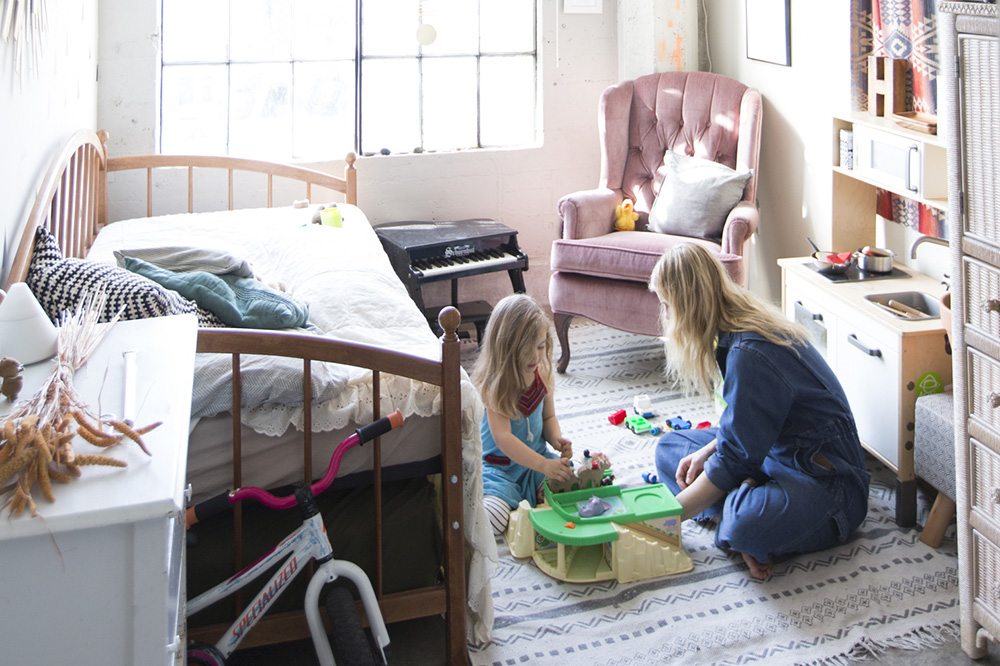
What You Need to Know About Raising an Introverted Child
Written by Sara Langer
Photography by Photographed by Michelle Drewes
Introverts are characterized by their need for solitude and quiet to recharge from our overstimulating world. Research shows that anywhere from a third to half of the population identify as introverts. Often described as “quiet” and “shy”, it is important to understand that being introverted is not the same as being shy, which comes from fear of social judgment. An introvert can be confident with well-developed social skills, they may just prefer one-on-one interactions and more quiet environments—although it’s not uncommon for an introverted child to also feel shy.
Modern society often values the gregarious qualities of extroverts over introverts, so it is understandable why an introvert might feel like something is wrong with them. But introverts have a valuable set of characteristics that should not be overlooked. Those who identify as introverts tend to be more reserved and introspective and they need alone time to recharge after being around large groups of people. But they also have high self-awareness, are good listeners, are committed and goal-oriented, and they take their time to think through a problem.
People don’t usually “grow out” of being introverted, it is a core part of their personality. Introversion and extroversion, it should be noted, also exist on a spectrum. But oftentimes it’s clear which way your kid might be leaning. To gain more insight into raising an introverted child, we spoke with Susan Cain, “chief revolutionary” of the Quiet Revolution and author of the bestselling books Quiet: The Power Of Introverts in a World That Won’t Stop Talking and Quiet Power: The Secret Strength of Introverts.
Cain, a self-proclaimed introvert, also happens to have given one of the most viewed TED Talks ever. In it, she describes a shift in society during the 20th century that historians call the culture of personality. People began moving from rural areas to big cities and they had to prove themselves and stand out from the crowd in order to succeed.
Overall, Cain sees the beauty of extroverts and introverts coexisting and working together to create a more balanced world, but she also believes that the world we are living in right now is a world designed for extroverts. Introvert skills, expertise, and positive attributes can often go unnoticed or under-appreciated. With this in mind, Cain shares some simple tips and insights on parenting an introverted child.
Follow your child’s pace.
“Parents of shy or introverted children need to understand that these kids have what I call a ‘long runway’ before they can take off and fly. That means when they are confronted with new experiences, for example, learning how to swim, it will often take them longer to acclimate to those experiences than it would for a more extroverted child. And that is totally fine and the right response to that is not to overprotect them. In the case with swimming, the answer is not that they don’t need to learn how to swim, but the parents should be going at the child’s pace. Maybe take them to the pool when it is quiet and not too busy and let them just dip their toes in the water to start. Then you’ll come back and do a little more. Look for a lesson that’s conducted when the pool is quite quiet. You want to ease in gradually to those types of experiences.”
Check-in with your own expectations and values.
“It’s key for parents to think about how they feel internally about their child being quiet and cautious because whatever they feel is going to communicate itself to their child. And they need to know that you think they’re great the way they are. I say this because I’ve heard from so many kids and also grown-ups, into their 50’s and 60’s, who still remember the way their parents communicated with them. They’re often sent a message that something is wrong with them for being shy or because they want to spend a lot of time reading or doing art projects on their own. So, it’s really important for parents to send the messages that their kids are great the way they are and that the parent is going to help them acquire a few skills along the way to succeed and feel comfortable in an extroverted world.”
Take it in stages.
“When they’re entering a new environment, like a new school, you want to make sure that you show them the school beforehand so they can get used to the physical environment. Introduce them to the teacher if that’s possible. Try to make sure they know at least one or two other kids and arrange playdates beforehand. Anything you can to do to make the environment they are entering not quite as alien or strange as it might otherwise be. It’s also helpful to find out from your child who it is that they would like to be friends with, who are the kids in the class that they like. Then you can partner with the teacher and let the teacher know that and ask the teacher to help arrange opportunities for your child to be with those kids. And this is important, not only for that particular friendship, but for many kids having one ‘bridge friend’ will help them enter into the larger social sphere. If they have that one point of comfort, ease, and familiarity it can make it much less intimidating.”
Schools are built for extroverts, so arm your introvert with the tools to navigate it.
“School itself, by its nature, is built for extroverts. And there is really not much we can do about that because we have a whole population of children who need to be educated, so it must be done in large groups. More and more classrooms are being conducted as big group projects, as opposed to individual kids working on their own, and that can be very over-stimulating for introverted children. The good side of it is that can also be a way for introverts to get to know their classmates in ways that might be hard to do if they just had to rely on recess and lunch. Parents can try and give children strategies for speaking up in class. Suggest that they try asking a question as opposed to answering a question. That can often feel less intimidating. Parents can talk with the teacher and let them know what their child is really interested in and confident about and hopefully, the teacher can try and draw the child in with those topics. Parents can try role-playing with their child so they can practice speaking up at home. They can get used to raising their hand, being called on, and hearing what their voice sounds like so they feel more comfortable speaking up. Schools and other larger group activities can be particularly draining for introverted children. The may need quiet and alone time to recharge their batteries at the end of the school day.”
It’s ok not to say hello, at first.
“One thing that comes up a lot, especially with younger children, is being uncomfortable with social niceties, such as saying hello to a stranger or greeting a distant relative that comes for a visit and having to answer questions. Parents will often feel that the child is being rude or coming across as rude, but parents need to understand that it has nothing to do rudeness, it has to do with severe discomfort. And that discomfort will dissipate with time, it just may take longer than it would for someone more extroverted. So, what do you do? One thing is to talk with the child matter of factly about it. Tell them about times that you have felt uncomfortable yourself. You could say, ‘Sometimes I feel that way, too. Feeling that way is part of life, but here is how I handle those feelings. Let’s figure out a way for you to feel comfortable.’ And a little bribery doesn’t hurt. You could offer, ‘The next time Aunt Sophie comes over if you can say hello then we will go out to ice cream after. I know you can do it.’ The key is to say it in a way where you are in on it with them, so they don’t feel bad about it. You are just working on this challenge together.”
Introversion is partially due to our biological make-up.
“Being an introvert can be due to nature and nurture, but it is one of the more inheritable personality traits. It appears that introverts and extroverts have different nervous systems. Introverts have nervous systems that react more to stimulation. That is why in a hyper-stimulating environment, like a school, introverts can become easily overwhelmed. All of the signals in their body are telling them, ‘Go to a mellow, more quiet place where fewer inputs are coming at you,’ yet they cant. And extroverts have nervous systems that react less to stimulation. So, when you tell them to sit quietly and write an essay or work on math problems, they can get very restless because their nervous systems don’t have enough input coming in. Those differences in our nervous systems affect our lives in ways we’re often not aware of but are quite profound. And scientists have detected these differences in babies as young as 4 months old.”
For more parenting advice, check out our articles on Raising a Creative Child, Teaching Children Empathy: A Guide For Every Age, and 10 Tips On Raising Optimistic Kids.
Share this story




